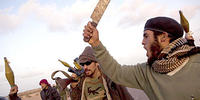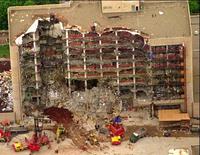-
U.S. deploys UAVs to Libya

In response to NATO’s air dominance over Libya, the Libyan military and the foreign militias Gaddafi has recruited from other African countries have changed their tactics; they now ride around in pick-up trucks dressed in civilian cloths, thus making it difficult to identify them from a high-flying aircraft; also, in addition to shelling cities and other locations where the anti-Gaddafi forces congregate, the pro-Gaddafi forces have engaged in urban warfare; they place snipers on balconies and roof-tops to terrorize the pro-rebel population at the same time that small units, operating in the streets, ambush and engage the disorganized rebel forces; the UAVs are meant to provide NATO commanders with better information on what is going on streets and between buildings; Gen. James Cartwright, the vice chairman of the Joint Chiefs of Staff, said the use of drones will give the edge to the international forces in crowded urban areas, where they are struggling “to pick friend from foe”
-
-
ME turmoil offers tough choices for Western democracies
The West should be more discriminating and judicious when it comes to supporting this side or that in the current turmoil in the Middle East, and judge each case on its merits; we should, in other words, pick and choose rather than automatically assume that all anti-government protesters are good and all governments, even if less than perfectly democratic by our standards, are bad; always siding with anti-government protesters is easy, but also politically and morally shallow; picking and choosing is more demanding because to do that one must familiarize oneself with complex situations
-
-
Experts call for rules of the road for drone use in the Americas

More and more Latin and Central American countries are using UAVs for domestic policing missions; these drones are employed as a high-tech answer by government to problems such as drug trafficking, gang violence, deforestation, and other illegal activities; experts say that Latin American countries should collaborate in developing a code of conduct that will prevent the arming of drones and assuage civilian concerns
-
-
Bill prohibits joint U.S.-China scientific activity
Language inserted into the 2011 spending bill would prohibit any joint scientific activity between the United States and China that involves NASA or is coordinated by the White House Office of Science and Technology Policy (OSTP); Rep. Frank Wolf (R-Virginia), the author of the prohibition, says: “China is spying against us, and every U.S. government agency has been hit by cyberattacks —- They are stealing technology from every major U.S. company. They have taken technology from NASA, and they have hit the NSF computers. —- You name the company, and the Chinese are trying to get its secrets”
-
-
Campaign in Libya likely to be a drawn out affair

NATO campaign has so far failed to yield the desired results, for four reasons: new tactics by Gaddafi’s forces and militias have negated NATO’s air superiority; NATO members are divided among themselves as to the ultimate goals of the campaign and its immediate tactics; the rebel forces are utterly ineffective as a military force; and the rebel leadership is divided in incoherent; unless all these factors change — that is, NATO finds a military response to Gaddafi’s ever-changing tactics; NATO members become more unified in their approach; the rebels develop into an effective military force; and the rebel leadership become more unified — it is not likely the campaign will end any time soon; this does not mean it will not succeed, though, as Gaddafi and his regime are under a tight economic and arms embargo, and he is likely to get weaker over time, even if it is a long time
-
-
2002 Color-code terror alert system, RIP
On 26 April a new terrorist alert system — the National Terrorism Alert System (NTAS) — will go into effect, replacing the color-code alert system which has been in effect since 2002; the new system will include “imminent threat” and “elevated threat” alerts; the “imminent threat” alert will warn of a credible, specific, and impending terrorist threat against the United States; in some cases, alerts will be sent directly to law enforcement or affected areas of the private sector
-
-
Atlanta opposes tough immigration law fearing financial backlash
The Atlanta City Council is attempting to persuade Georgia governor Nathan Deal from signing a tough Arizona-style immigration law that was recently passed; the council’s opposition to the bill is largely based on financial reasons as it fears losing millions of dollars in revenue from its tourism and convention business if organizations boycott Georgia as a result of the law; similar financial reasons recently motivated the Arizona business community to mobilize against several controversial immigration bills; it is estimated that the backlash against the recent Arizona immigration law resulted in more than $200 million in lost revenues to businesses
-
-
Arizona sheriff accuses Border Patrol of suppressing arrest figures
A sheriff in Arizona has accused U.S. Border Patrol officials of instructing local law enforcement officers to stop arresting immigrants illegally entering the United States along its southern border; the sheriff says he had been instructed by federal officials to not arrest immigrants crossing illegally because they wanted to reduce figures for the number of apprehensions at the border; DHS Secretary Napolitano recently cited a reduction of apprehensions along the border as evidence that the border was more secure than ever; U.S. Border Patrol officials staunchly denied these claims
-
-
Secret bomb-proofing building design posted on the Web

The Pentagon is building two towers in Alexandria, Virginia, to house 6,400 personnel; the Army Corps of Engineers inadvertently posted the bomb-proofing specifications for the new buildings on the Web; experts say this will allow terrorist to learn how to circumvent the building defenses; there is another problem; the documents reveal that the specifications call for the building to be designed to resist threats posed by vehicle bombs detonated outside the building’s security perimeter carrying the equivalent of 220 pounds of TNT; experts say this is not enough; Timothy McVeigh used 4,000 pounds of TNT in Oklahoma City in 1995; the 1993 attempt on the World Trade Center involved 900 pounds; the attack on the Marine barracks in Lebanon in 1983 involved 12,000 pounds of TNT
-
-
Rorschach test for terrorists

DHS wanted to test a Russian mind-reading technology which worked, more or less, like a Rorschach test for terrorists; developers of the method insisted that the technique was sound and objective; it is not clear what happened with the research work and whether or not it has yielded any practical results; neither the agency nor the institute contracted to do the work issued follow-up information
-
-
Iran admits Stuxnet's damage
A senior Iranian official admitted that the Stuxnet malware, which infected tens of thousands of computers and servers used in Iran’s nuclear weapons complex inflicted serious damage on Iran’s nuclear program, including large-scale accidents and loss of life
-
-
Violence sharply up in Pakistan

A new report says more than 2,500 people were killed in militant attacks in Pakistan in 2010; nearly half of victims were civilians killed in suicide blasts. There were 67 such attacks last year; at least 900 people had been killed in U.S. drone strikes during the same period; the number of people killed by the army is not mentioned, but it estimated to be in the region of 600-700; 1,713 people had been killed by militants over the preceding eighteen months (2008-09), while 746 people had died in drone attacks during the same period; the report highlighted a growing spread of hate literature and said it had been monitored that in the mainstream Urdu newspapers 1,468 news articles and editorials promoted hate, intolerance, and discrimination against Ahmedis
-
-
Syria's wrong numbers; ME democratic hard test begins now
In instructions to Syrian security forces engaged in suppressing the anti-government protests, the government cautions that when security forces and snipers enter protest areas, “the number of people killed must not exceed twenty each time, because it would let them be more easily noticed and exposed, which may lead to situations of foreign intervention”; the Syrian regime may have a naive view of Western public opinion; killing twenty-one or twenty-two, rather than “only” twenty, pro-democracy Syrian activists a day would be enough to draw the attention of Western public opinion to the machinations of the Syrian regime? Would that it were true!
-
-
House panel extends chemical plant safety act
In 2006, Congress first authorized DHS to regulate security at high-risk chemical facilities. In response, DHS developed the Chemical Facility Anti-Terrorism Standards (CFATS); to date, DHS has reviewed information submitted by more than 39,000 chemical facilities and determined that 4,744 are high-risk and, therefore, covered under CFATS; yesterday, a House panel voted for a 7-year extension of CFATS
-
-
Shoring up U.K. infrastructure essential to country's welfare
The United Kingdom suffers from some of the most congested infrastructure in the developed world and a failure to invest in these will have serious impacts upon the country’s long-term economic future; improvements to transport, energy, and ICT infrastructure could increase GDP by an additional 0.7 percent
-
More headlines
The long view
Factories First: Winning the Drone War Before It Starts
Wars are won by factories before they are won on the battlefield,Martin C. Feldmann writes, noting that the United States lacks the manufacturing depth for the coming drone age. Rectifying this situation “will take far more than procurement tweaks,” Feldmann writes. “It demands a national-level, wartime-scale industrial mobilization.”
No Nation Is an Island: The Dangers of Modern U.S. Isolationism
The resurgence of isolationist sentiment in American politics is understandable but misguided. While the desire to refocus on domestic renewal is justified, retreating from the world will not bring the security, prosperity, or sovereignty that its proponents promise. On the contrary, it invites instability, diminishes U.S. influence, and erodes the democratic order the U.S. helped forge.
Fragmented by Design: USAID’s Dismantling and the Future of American Foreign Aid
The Trump administration launched an aggressive restructuring of U.S. foreign aid, effectively dismantling the United States Agency for International Development (USAID). The humanitarian and geopolitical fallout of the demise of USAID includes shuttered clinics, destroyed food aid, and China’s growing influence in the global south. This new era of American soft power will determine how, and whether, the U.S. continues to lead in global development.
Water Wars: A Historic Agreement Between Mexico and US Is Ramping Up Border Tension
As climate change drives rising temperatures and changes in rainfall, Mexico and the US are in the middle of a conflict over water, putting an additional strain on their relationship. Partly due to constant droughts, Mexico has struggled to maintain its water deliveries for much of the last 25 years, deliveries to which it is obligated by a 1944 water-sharing agreement between the two countries.
How Disastrous Was the Trump-Putin Meeting?
In Alaska, Trump got played by Putin. Therefore, Steven Pifer writes, the European leaders and Zelensky have to “diplomatically offer suggestions to walk Trump back from a position that he does not appear to understand would be bad for Ukraine, bad for Europe, and bad for American interests. And they have to do so without setting off an explosion that could disrupt U.S.-Ukrainian and U.S.-European relations—all to the delight of Putin and the Kremlin.”
How Male Grievance Fuels Radicalization and Extremist Violence
Social extremism is evolving in reach and form. While traditional racial supremacy ideologies remain, contemporary movements are now often fueled by something more personal and emotionally resonant: male grievance.
